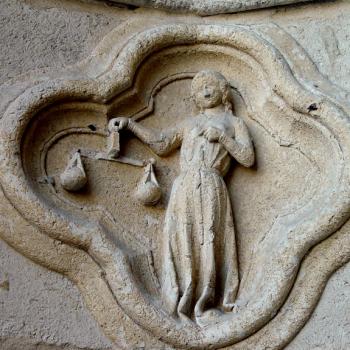 For centuries, Christians have long discussed the Trinity. We usually give a simple formula to describe the Trinitarian persons, making it seem like faith in the Trinity is just as simple: The Father gave birth to the Son and the Holy Spirit spirated out of the Father and through the Son.
For centuries, Christians have long discussed the Trinity. We usually give a simple formula to describe the Trinitarian persons, making it seem like faith in the Trinity is just as simple: The Father gave birth to the Son and the Holy Spirit spirated out of the Father and through the Son.
What does this really mean for us? Who is the Father? Do we really know? In reality, though we give him the name of the Father, we would be wrong in assuming that we know much about him through it. He is not to be assumed as some cosmic father-figure in the sky. We must not think of him as either the grump, angry patriarch nor as the jolly old man. He is something entirely else. He is known to us, as Sergius Bulgakov explained, through the revelation of the Son and the Spirit. What we know of him is less than what we do not know; he is who we are aiming for, the great and transcendent mystery which is best described by silence:
The Father … Is it possible to say anything about Him, who is Silence, Mystery, the Transcendent even in the Trinity? He is revealed, but only in the other hypostases.[1]
The revelation of God the Father, the first person and origin of the rest of the Holy Trinity, comes to us from Jesus Christ (God the Son) and the Holy Spirit. It is likewise with Jesus Christ and through the Holy Spirit we are taken to and able to experience the Father. Jesus made it clear, we come to the Father by him:
Jesus said to him, “I am the way, and the truth, and the life; no one comes to the Father, but by me” (Jn. 14:6 RSV).
God the Father is revealed through the Son because of their unity: “I and the Father are one” (Jn. 10:30 RSV). In and with the Son, we have the Father:
Jesus said to him, “Have I been with you so long, and yet you do not know me, Philip? He who has seen me has seen the Father; how can you say, `Show us the Father’? Do you not believe that I am in the Father and the Father in me? The words that I say to you I do not speak on my own authority; but the Father who dwells in me does his works. Believe me that I am in the Father and the Father in me; or else believe me for the sake of the works themselves (Jn. 14:9-11 RSV).
The Son of God became human, opened himself up to us so that we could become one with him (the body of Christ). When we do so, in our communion with the Son, we are able to be taken up into the kingdom of God and experience the Father. The Holy Spirit, also one with the Father, knows and reveals the truth of the Father to us, as the Spirit of the Son:
For what person knows a man’s thoughts except the spirit of the man which is in him? So also no one comprehends the thoughts of God except the Spirit of God. Now we have received not the spirit of the world, but the Spirit which is from God, that we might understand the gifts bestowed on us by God. And we impart this in words not taught by human wisdom but taught by the Spirit, interpreting spiritual truths to those who possess the Spirit (1 Cor. 2:11-13 RSV).
Through Jesus Christ and the Holy Spirit, we become children of God; we become partakers of the divine nature, as Sergius Bulgakov explained: “The gift of the adoption of men in the Son of God, the God-Man, is bestowed by the Holy Spirit, the spirt of adoption, Who gives birth to them ‘maternally’ as children of God and clothes them in Christ.” [2]
We are led by the Son and Spirit to the Father. Through them, we are able to know and experience him. This might be surprising, because it is assumed that what was revealed in the incarnation was the truth of the Son, and that before the incarnation, our experience was mostly with the Father. While this is one way to interpret history, many others have taken into consideration what Jesus said, that Moses spoke of him, as indicating that it was in and through the Son that Moses knew God. The Son is always the one who encounters us in a discernable fashion, face to face so to speak; it is through him that we come to know the fullness of God. Without such grace, without revelation, we would find ourselves in the dark. We would be stuck in the veil of sin:
See what love the Father has given us, that we should be called children of God; and so we are. The reason why the world does not know us is that it did not know him. Beloved, we are God’s children now; it does not yet appear what we shall be, but we know that when he appears we shall be like him, for we shall see him as he is. And every one who thus hopes in him purifies himself as he is pure (1 Jn. 3:1-3 RSV).
We come to know and encounter the Father by being children of God in Jesus, with the Spirit giving us our spiritual birth, guiding us like a loving mother, making sure we mature in the spirit and become capable of engaging the Father. What is important is that we encounter him in and through the Son and Spirit, and not without them; we are revealed the Father, we come to know the Father, and yet he transcends us, and is indeed quite mysterious to us. We might construct notions as to who he is, we might use revelation as the means by which we discuss what we understand of who he is, but we must accept that all that we say, all that we discuss, pales in comparison to who the Father really is. He transcends what we think we know of him. While this is true of all three persons of the Trinity, for they are God and God is incomprehensible, as Bulgakov said, within the Trinity, it is the Father who is the most hidden to us, and so what we say of the other persons is most manifest and best appropriated to the Father. The Son and Spirit actively reveal themselves to us in their own ways, while the Father reveals himself to us in and through the Son and Spirit.
The Trinity has been revealed to us; we know the Father because of the Son. The Son reveals himself to us as the only begotten of the Father. This tells us that there is a Father. This is where the revelation of the Father comes to us from the Son. For the Son to be the Son of the Father, and for the Son to be God, the begetting must be eternal; that is, there has to be no time in which the Son was not. The Son, as Son, is unchanging; as such, Dumitru Staniloae explained that his birth itself must be part of the eternal, unchanging activity found in God:
The birth/begetting of the Son from the Father expresses by this term “birth” or “begetting” only the unchanged position of the two Persons and the unity between them. The Son exists eternally in the movement of being born from the Father. [3]
But, as St. Gregory the Theologian preached, in exploring these notions, in using the nomenclature of Father and Son, we must see it at best as analogous to what occurs in the Divinity, and that the mode of generation, how it exists and works, is something which we cannot define; it must be honored in silence, in the silence of the Father himself:
First, cast away your notions of flow and divisions and sections, and your conceptions of immaterial as if it were material birth, and then you may perhaps worthily conceive of the Divine Generation. How was He begotten?— I repeat the question in indignation. The Begetting of God must be honoured by silence. It is a great thing for you to learn that He was begotten. But the manner of His generation we will not admit that even Angels can conceive, much less you. Shall I tell you how it was? It was in a manner known to the Father Who begot, and to the Son Who was begotten. Anything more than this is hidden by a cloud, and escapes your dim sight.[4]
There is therefore a divine Person who generates an Other for all eternity; that generation is said to be begetting but also birthing, revealing that what is found in human fathers and mothers happen to be together in the generation of the Son. Human gender must not be placed upon the Father despite being called Father, because the name employed is a revealed convention helping us engage who the Person is by what is done; confusing it as univocal with gender is to dismantle the divinity which is neither male nor female but the foundation for both in humanity.
We are able to say something about the Father because of revelation, but what we say must be understood with the constant denial of the conventions with any implications which come from them by human representation. We must not turn conventional truths which point to the absolute truth as being the absolute as the absolute is in itself. The Father is not begotten; he is the source and foundation of the Trinitarian relations, so that we know him in and through his position in the Divine Trinity. The Son and the Spirit reveal their foundation in the Father so that they can reveal the Father to us, but the Father does not reveal any foundation beyond himself, and so we know him best by his relative position in the Trinity, as St. Bonaventure indicated:
Since it is proper to the Father that He be without birth and ungenerated, He is the beginning without a beginning and therefore He is the Father. Innascibility designates Him in a negative manner, and as a consequence it designates Him by the mode of position, because innascibiility in the Father posits the source of His fullness. The beginning without a beginning designates Him by the mode of position in a negative manner. Being the Father designates Him by mode of position and relation, properly completely, and determinately. [5]
God rules over creation; there is but one God, so that though we discern God in three persons, we have to keep to a divine “monarchy,” one God who rules over all things through love. That there is one ruler, one God, over all, many philosophers could intuit; but the inner-makeup of the God as Trinitarian is a truth that only revelation could provide. Once we take the two truths together, we can then discern that the Trinity remains one because within it, there is a unity based upon the foundation of the Trinitarian relations centering upon the Father:
But Monarchy is that which we hold in honour. It is, however, a Monarchy that is not limited to one Person, for it is possible for Unity if at variance with itself to come into a condition of plurality; but one which is made of an equality of Nature and a Union of mind, and an identity of motion, and a convergence of its elements to unity — a thing which is impossible to the created nature — so that though numerically distinct there is no severance of Essence. Therefore Unity having from all eternity arrived by motion at Duality, found its rest in Trinity. This is what we mean by Father and Son and Holy Ghost. The Father is the Begetter and the Emitter; without passion of course, and without reference to time, and not in a corporeal manner. The Son is the Begotten, and the Holy Ghost the Emission; for I know not how this could be expressed in terms altogether excluding visible things.[6]
There is yet another aspect to the unity of the Trinity. It is found in its essence, that which Sergius Bulgakov called Divine Sophia, the Wisdom of God which is God (just as the image of God in humanity is able to be said to be called Sophia, for she is also revealed there, making for what is describe as divine-humanity). Each person of the Trinity possesses Sophia for themselves (being fully God) and yet reveals and expresses her through their relative distinctions. Each are Sophia, each reveals Sophia in their own unique way, even the Father in the inexpressible silence of the unorginate source of the Trinity reveals in that silence the glory of the divine nature, Divine Sophia:
But now we arrive at a new equality: the Father is Sophia (but, of course, not vice versa). This equality expresses the idea that, insofar as Sophia is objective, divine self-revelation, she reveals and expresses the hidden essence of the Father; she is His genuine predicate, whose true Subject He is. Sophia, as Divine-humanity belongs to the Father; she is His revelation. In this sense, the Father is Divine-humanity; however, He is the Divine-humanity which is not manifested, which is hidden and mysterious, but which is becoming manifested in divine self-revelation. The Divine-humanity is the manifested countenance of the Father. [7]
The Father is revealed in and through the Son and Holy Spirit, but likewise, the image and likeness of God is found in us, found in creation, and so hidden in us, we can find and experience a glimpse of the Father through the image and likeness of God in us, an image and likeness which is Trinitarian in us because God is a Trinity. But it is only in and through the Son and Spirit, even in the traces of the Trinity in the world, shall we come to know the Father in those traces; the Son and Spirit always point to and lead us to the Father, and so within the image of God in nature, we find the shadows of the Son and Spirit pointing to the mysterious Father within.
The Father, then, is a mystery. The Son and the Spirit, in the inner relationship of the Trinity, remains a mystery but they come to us, reveal themselves to us with skillful means, communicating their persons to us so we can know them without comprehending them, and through them, we come to know the Father. Who is the Father? Who is the Father to us? As iconographers know, we must not imagine him to be some grandfather figure in the sky, the great and jolly old man; he is not incarnate, and indeed, he is not a he – nor a she – though what is found in human masculinity and femininity comes from him as he generates the Son in eternally birthing the Son through an eternal begetting; God the Father comes to us as the benevolent love found in generation, the principle of generation, which we can all know and experience. But we must not confuse our thoughts about him as being him; we must let it all vanish, to come to the silence so that we can then be open to him and his bountiful generative love. If we think of him as the angry old man who hates us, we have lost him; if we see him in the Son and our generation in the Spirit, we know he is love, loving us beyond compare. We cannot have him so long as we see him in anger and hatred, because through such malice we turn away from him. He recedes from us when we put up a veil of hate between him and us. Once that veil is removed, once we come to him through our spiritual rebirth in the Logos and Spirit, we will learn to put off every false conception of him, every false conception which could likewise make a barrier between him and us. Then we can be comforted and loved by him, loved in and through the spirit of adoption which has raised us up to that encounter which transcends all words. God the Father is not some old man in the sky – God the Father is the marvelous and glorious unbegotten foundation of all being. If we want to honor God, we must first silence all constructs which limits his bountiful love by human conventions; then through the Son and Spirit we can encounter him in that silence and find ourselves in the kingdom of God, the divine womb of love which holds us and nourishes us in eternity.
[Image=Jesus and the Doctors of the Faith by circle of Jusepe de Ribera [Public domain], via Wikimedia Commons]
[1] Sergius Bulgakov, The Comforter. Trans. Boris Jakim (Grand Rapids, MI: William B. Eerdmans Publishing Company, 2004), 359.
[2] Sergius Bulgakov, The Comforter, 367-8.
[3] Dumitru Staniloae, Theology and the Church. Trans. Robert Barringer (Crestwood, NY: St. Vladimir’s Seminary Press, 1980), 76-7.
[4] St. Gregory Nazianzus, Oration XXIX (The Third Theological Oration) in NPNF2(7):303.
[5] St. Bonaventure, Breviloquium. Trans. Erwin Esser Nemmers (St Louis, MO: B. Herder Book Co., 1946), 28.
[6] St. Gregory Nazianzus, Oration XXIX (The Third Theological Oration) in NPNF2(7):301.
[7] Sergius Bulgakov, The Comforter, 366.
Stay in touch! Like A Little Bit of Nothing on Facebook













